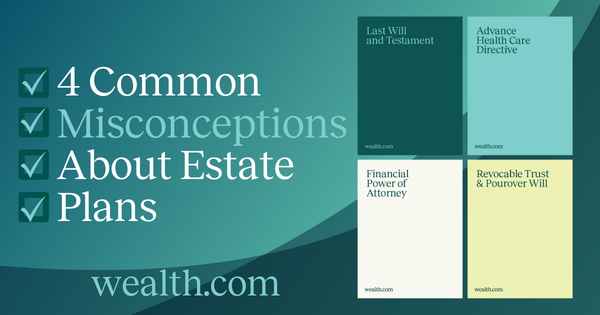4 Common Misperceptions About Estate Plans
Moving past estate planning misconceptions can be difficult. Recent research points to how we can overcome these hurdles and help more families thrive.

If you don’t have one yet, ask yourself what’s holding you back.
The words most often associated with estate planning are “important” (53%), “responsible” (52%) and “smart” (42%), according to a survey conducted in the U.S. by WALR in partnership with Wealth in December 2021. Yet only 53% of us have an estate plan. What drives this dichotomy?
Put simply: misperceptions.
Here, we examine the top four reasons people aren’t doing the “important, responsible and smart” work of creating an estate plan — and how to get over those hurdles.
Misperception #1: It’s something to do… later.
The survey findings suggest that when it comes to estate planning, people are prone to procrastination. The No. 1 reason respondents gave for not having an estate plan in place is “I just haven’t gotten around to it” (40%), indicating that they don’t consider it something they need to do right now.
But here’s why you should: While nobody likes to think about dying young, if you’re the parent of small children, it behooves you to prepare for the unthinkable. This is where the Will portion of an estate plan comes in. (For the uninitiated, estate plans often include documents such as a Will or a Trust, power of attorney, a health care directive and beneficiary designations, plus regular reviews and revisions.)
To ensure that your children are cared for in the way you want them to be, you’ll need to name who their guardians would be if both parents die before the kids turn 18. Without those arrangements, the courts will intervene and decide who will raise your children.
Even if you don’t have children, there are other people who deserve protection. Surely, you’ve seen this plot on TV: Someone with money dies, and the war between family members begins. It happens IRL, too. One sibling might think they deserve more than another, or one sibling may think they’re well equipped to handle the finances even though they’re drowning in debt. Without a plan in place, you have no control over who settles these debates.

Misperception #2: Estate planning is complicated.
You’re not alone in thinking this. For respondents to the survey who didn’t have a plan, 23% said a big reason is that, well, they don’t know where to start—20% said they don’t know anything about what estate planning entails. However, many people find it easy to create the major estate planning documents on their own—as long as clear directions are involved. For example, you can draw up a simple, valid Will using software, online or via an app. (Though you may want to crowdsource to find the most reliable options.)
Of course, if you have questions or need documents that are more specific than what’s offered publicly, you should seek personalized advice from an expert.
Misperception #3: I don’t own much, so I don’t need one.
Remember, an estate plan covers both your finances and your assets. Even if you’re just leaving behind property, if you don’t decide who receives it after you’re gone, you’re relinquishing control of what happens to it.
And even if you think you don’t have much money, when you die, your estate consists of not just the money you use day to day but also your life insurance, the equity in your house, the full value of your retirement plans — and everything else you own. That usually amounts to more than you anticipated.
Misperception #4: It’s too depressing to deal with.
Creating an estate plan forces people to confront both mortality and money, two issues that can be upsetting and tough to talk about. Perhaps reframing the situation can help. According to the WALR-Wealth survey, when people who have an estate plan in place were asked to describe the process of setting up a plan, the most common words they used were helpful, simple, empowering and relieving. But respondents who said they set up an estate plan in response to losing a loved one to COVID-19 were more likely to struggle with the process and describe it as confusing, tedious and, yes, depressing. These findings suggest that when estate planning is done before a stressful life event, it’s just not that bad.
Moreover, life is unpredictable. So why not draw up an estate plan? As Chief Growth Officer of Wealth, Tim White, sums it up, “Creating an estate plan is a genuine act of compassion for your loved ones and your greater community, if part of your plan includes charitable donations. There’s real value in the peace of mind that comes from knowing your legacy — whatever that means to you — will be intact after you die.”
